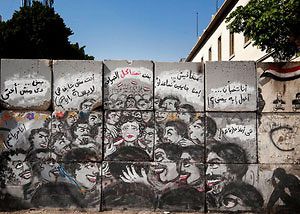The government’s ability to meet a new spike in Egypt’s violence is uncertain, even as the number of attacks outside the North Sinai governorate has decreased in recent years.
Tag: egypt
-
-
Data supplied by the Tahrir Institute for Middle East Policy support the assumption that the national share of violence has increasingly moved from the North Sinai to wider Egypt in recent years.
-
If the death sentences proceed as planned, it could lead to further instability in the country, including the reinvigoration of Morsi’s Muslim Brotherhood.
-
The Egyptian regime is unlikely to lose power in the short term, but a closer look reveals a government narrative that might be wearing thin.
-
One year after the ouster of Mohammed Morsi, Egypt’s Abdel Fattah al-Sisi seems to have a plan for stability that is likely to involve more repression and the loss of democratic gains made in 2011.
-
As elections approach, Egypt’s next president will need to address a stagnant economy, a precarious security environment, and increasingly high expectations.
-
Egypt’s revised constitution raised hopes that it would open up new possibilities for women, but so far, this has not happened.
-
According to historian Khaled Fahmy, the revolution in Egypt has just started.
-
Egyptian women and men will have to remain vigilant to ensure that any hard won freedoms are not sacrificed on the alter of stability, and that they are treated as dignified citizens rather than subjects of the state.
-
Egypt’s return to violence is an example of the souring of Arab Spring ideas, but democracy has always been problematic in the Middle East.














